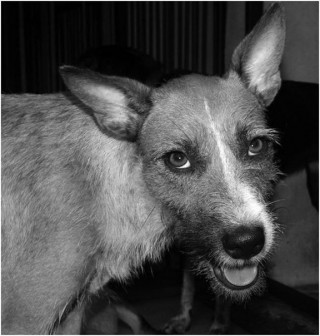Continued from last week
This disease affects puppies of the large, rapidly growing breeds, especially those three to seven months of age. It resembles scurvy in humans, but in dogs, the cause is uncertain. (Scurvy is due to a deficiency of Vitamin C.)
Because the dog manufactures his own Vitamin C (in contrast to man who has to depend on an outside source), it has been suggested that HOD in the dog maybe due to improper synthesis of this vitamin, or to a defect in its utilization by the tissues.
 Vitamin C is needed to make the framework for bone. In contrast, vitamin D is needed to mineralize bone, once formed.
Vitamin C is needed to make the framework for bone. In contrast, vitamin D is needed to mineralize bone, once formed.
HOD affects the long bones near the joints (wrists and the hocks). These joints become swollen, tender, and give rise to lameness. X-rays initially show a ‘moth-eaten‘ area in a long bone. Later, too much bone tissue is laid down (hypertrophic osteodystrophy). An unnatural growth of bone leads to deformities.

Some cases classified as HOD probably are due to improper feeding practices, such as feeding too many calories, giving too much calcium, and overdosing with vitamins during the growth period! So often, do vets have to advise clients not to add supplements to a balanced diet – such as those manufactured by reliable and internationally recognized pet food companies.
Overdosing with
vitamins
Many people think that a rapidly growing puppy needs to have supplemental vitamins and minerals in order to build strong bone. Modern name-brand commercial dog rations, made up for puppy growth and development, supply all the needed vitamins and minerals to sustain normal growth – provided the puppy or young dog eats it well, and is otherwise healthy (eg no worm burden). Vitamins and minerals in excess of those required will not add more bone and substance to the growing animal, and, as I have so often written, could produce deleterious effects on the pet’s growth.
When calcium, phosphorus, and Vitamin D are given to a dog beyond his capacity to use them normally, his growth and development can be adversely affected. Over-feeding and overdosing with vitamins, as mentioned above, can cause a bone disorder similar to HOD.
Vitamin and calcium supplements might be indicated for rapidly growing pups who are poor eaters. If you own such a dog, discuss this problem with your veterinarian.
I think we have now exhausted this topic.
Next week we will begin a new chapter.
Please implement disease preventative measures (vaccinations, routine dewormings, monthly anti-heartworm medication, etc) and adopt-a-pet from the GSPCA’s Animal Clinic and Shelter at Robb Street and Orange Walk, if you have the wherewithal to care well for the animals. Do not stray your unwanted pets, take them to the GSPCA’s Clinic and Shelter instead. If you do not wish your pet to have puppies or kittens, you may exploit the GSPCA’s free spay and neutering programme. If you see anyone being cruel to an animal, or if you need any technical information, please get in touch with the Clinic and Shelter by calling 226-4237.





